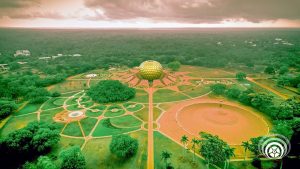In the grand tapestry of human civilization, each thread represents a unique culture, and every color signifies a diverse background. These myriad threads come together to weave the fabric of our shared existence, forming the intricate design of our world. It’s a unity, but not a total one; rather, it’s an innumerable unity, transcending the limitations of mere words.
In India, a land where the notions of guru and Avatar resonate deeply, there exists a unique opportunity to explore unity amid diversity. Here, you may find individuals who recognize and acknowledge these spiritual luminaries, but often with a subtle undercurrent—an expectation that these divine beings exist to fulfill personal desires. It’s a condition of surrender with a self-serving motive.
To truly emerge from this limited perspective, one must transcend the confines of human consciousness and the egoistic tendencies that bind us to individual desires. It’s not about broadening the scope of human consciousness—it goes beyond that, transcending the egoism that still prevails within humanity.
The notion of egoism, deeply rooted in our nature, hinders the realization of a higher unity. Humanity has long been evolving, forming nations and cultures as psychological units, eventually striving for political unity. These processes take time, but they persist against formidable challenges.
Is it possible for humanity to take a larger leap toward imperial unity, replacing national boundaries with a grander, unified vision? Nature has been moving in this direction for some time, with the emergence of conscious imperial ideals worldwide. But can the collective egoisms ingrained in humanity be modified or eradicated to establish external unity?
The psychological life of humanity today seeks greater unity—a living unity that fosters understanding, cooperation, and a shared sense of purpose. It’s not about enforcing uniformity but encouraging diverse development with mutual understanding. The idea is to create unity through a confederation of nations, allowing each unit its internal freedom and self-determination.
However, this looser form of unity raises questions. Can the spirit of separatism and the sources of conflict be overcome? Can it endure in the face of powerful divisive forces?
A free worldunion, by its nature, is a complex unity built on diversity, and this diversity should be rooted in free selfdetermination. It must respect the rights and voices of all its constituent parts, avoiding the imposition of unity through mechanical means.
Auroville, a pioneering experiment in human unity, envisions itself as a place for material and spiritual research, a living embodiment of true human unity. It’s a place where people from all corners of the globe can live in peace and harmony, transcending creeds, politics, and nationalities.
As the Mother of Auroville once said, “Auroville belongs to humanity AS A WHOLE because it amounts to nothing!” It seeks to discover the deep sources of human unity with the universe and strives to be a site for the joy and liberation of having no personal possessions.
The purpose of Auroville is clear: to realize human unity based on the teachings of Sri Aurobindo. It serves as a symbol of hope, a testament to the human spirit’s ability to reach beyond its limits in pursuit of unity amid diversity.
In the end, the quest for unity amidst diversity is not merely a political or social ideal. It’s a spiritual journey, a call to transcend the limitations of the ego and embrace a higher, more profound unity—the unity that recognizes the divinity in all beings and celebrates the beautiful mosaic of human cultures and backgrounds.



